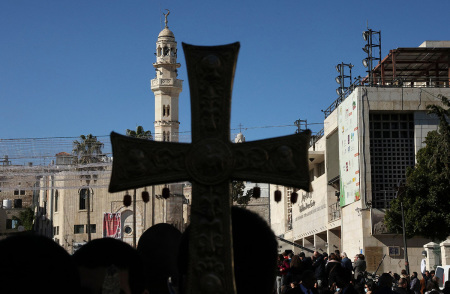Americans worry most have forgotten the true meaning of Christmas: survey

Three-quarters of Americans agree that most people have forgotten the true meaning of Christmas, a concern expressed by more Christians than non-religious individuals, according to a recent survey.
In a nationally representative survey of 1,023 adults, 84% of Christians believe that Americans have forgotten the true meaning of Christmas, with 50% strongly agreeing and 34% somewhat agreeing. Forty-two percent of all Americans strongly agree with this opinion, while 33% somewhat agree.
The survey was conducted from Dec. 9–11 by Ipsos using KnowledgePanel, with a margin of sampling error of +/- 3.3 percentage points at the 95% confidence level.
Among non-religious Americans, 60% believe that many have forgotten the true meaning of Christmas.
Conversely, 4% of Christians strongly disagreed with the statement, and 9% somewhat disagreed. Regarding all Americans, 6% strongly disagreed with the statement, and 10% somewhat disagreed.
The sentiment that Americans have forgotten what Christmas means proved prevalent among Republicans, with 88% agreeing compared to 66% of Democrats. Age also played a role in how strongly people resonated with the sentiment, as 81% of those 50 and older agreed that many have forgotten Christmas’ true meaning.
Among the younger generation, 68% of individuals 18 to 24 agreed most have lost the true meaning, compared to 66% of people ages 25 to 34. In the category of participants ages 35 to 49, 72% agreed that most have forgotten the true meaning of Christmas.
Regarding holiday decorations, 85% of Americans said they decorate their homes during the season, and 41% said they start removing them the first week of January. Forty-eight percent say people should not leave their decorations up later than the first week of January. Another 23% believe people should remove Christmas decorations by late January.
In terms of Christmas music, 87% of respondents think that after Thanksgiving is the most appropriate time to start playing holiday tunes, an opinion that appeared to be consistent across subgroups.
Fifty-four percent of Americans were able to name a Christmas song that they found annoying, with 12% naming Mariah Carey’s “All I Want for Christmas,” followed by “Jingle Bells” (6%) and “Grandma Got Run Over by A Reindeer” (5%).
Despite concerns from some that the country has forgotten the reason for celebrating Christmas, another survey found that the holiday service draws the largest crowds to church.
As The Christian Post reported, in a recent Lifeway Research poll of 1,000 Protestant pastors in the United States, 48% identified Christmas Eve services as the “most attended Christmas event” at their church. Seven percent of pastors cited Christmas Day services as their church’s “most attended Christmas event.”
Twenty-six percent of pastors pointed to a Christmas-related event taking place in the third week of December as the most popular gathering at their church. Another 10% listed an event taking place in the second week of December, and 6% reported the highest levels of attendance during an event in the first week of December or earlier.
According to 5% of pastors, their church’s most popular Christmas event occurs in the first week of January.
Breaking down the results among different Protestant denominations, 84% of Lutheran pastors said Christmas Eve services are the most attended Christmas event at their church. Seven percent of Lutheran pastors cited an event occurring in the third week of December as the most well-attended event at their church, compared to 45% of Pentecostal pastors.
In addition, pastors affiliated with the Church of Christ (37%) and Baptist pastors (35%) cited high church attendance during this time period.
Mainline pastors (60%) also said that Christmas Eve services were the most-attended Christmas events at their church, compared to 44% of Evangelical pastors. Thirty percent of Evangelical pastors selected an “event the third week of December” as their church’s most-attended Christmas event, while just 17% of mainline pastors did the same.
“Christians have many different Christmas traditions and so do their churches,” said Scott McConnell, executive director of Lifeway Research, who addressed the results of the survey in a statement. “Family and church traditions are most likely to coincide for Christmas Eve services, but many evangelical churches see the highest holiday attendance earlier in December.”
Samantha Kamman is a reporter for The Christian Post. She can be reached at: samantha.kamman@christianpost.com. Follower her on Twitter: @Samantha_Kamman





















